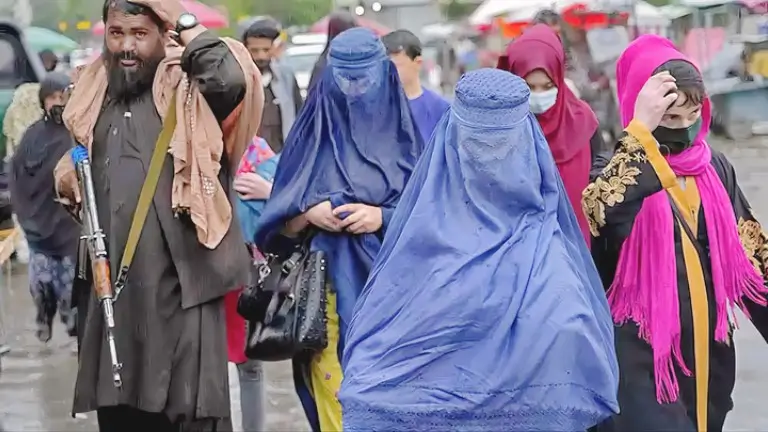Afghanistan has a turbulent history. In the last three decades, the country has been occupied by Soviet troops and US-led international forces, and in the years between, it has been ruled by militant groups, including the Taliban. For the last three decades, it was Afghan women who suffered a lot and struggled to protect their basic rights. In 1919, Amanullah Khan, the king of Afghanistan, introduced significant reforms in the country, including granting Afghanistan’s women the right to vote and opening the first school for girls in Afghanistan. His wife, Queen Soraya Tarzi, actively supported women’s education and worked towards the emancipation of women from restrictive traditions.
The Soviets invaded Afghanistan in 1979. Women’s rights were rapidly being rolled back during the Soviet uprising, with the emergence of a civil war between mujahideen groups and government forces. Americans and the Soviet Union supported different sides in the Afghan civil war. Meanwhile, some religious extremist groups took it as an opportunity to gain more control over the country, resulting in increasing restrictions on women’s freedom.
After achieving victory against the Soviet Union, the Mujahedeen and later the Taliban imposed severe restrictions on the rights of women. The Taliban first emerged in 1994, out of militant groups that were founded during the Soviet invasion. By 1996, they had seized control of Afghanistan for the first time and rolled back freedoms for women. Under Taliban rule, women were not allowed to leave their homes without a mahram, were banned from education, involvement in politics, or public speaking.
Afghan women were the ones who lost the most from the war and militarization.
Horia Mosadiq, an Afghan human rights activist, political analyst, and journalist
After the intervention of NATO forces in 2001, activists were able to fight for and achieve important legislation. Women’s rights expanded, girls attended school, women had jobs, and the government enshrined women’s rights in the constitution. Unfortunately, after the Taliban took control of Afghanistan, the situation worsened.
After seizing power on August 15, 2021, the Taliban announced in their first press conference, “We are going to allow women to study and work within our framework. Women are going to be very active in our society,” but they imposed a strict interpretation of Sharia law on women. Despite their initial promises to respect women’s rights within the framework of Sharia law, the Taliban issued numerous decrees that prevent women and girls from exercising their basic rights to freedom of expression, independence, work, and education.
The Taliban portrayed their leader’s ban on secondary education for women and girls as based on religious purposes, but Muslim scholars say gender-based denial of education has no justification in Islam. Since 2009, cases against the misbehavior, violence, and maltreatment of women have been brought under the law on the elimination of women’s affairs. After the Taliban takeover, the Ministry of Women’s Affairs was abolished. They re-established their Ministry for the Propagation of Virtue and Prevention of Vice, which is responsible for enforcing the Taliban’s moral code, including its strict dress code and gender segregation in society.
The Taliban continues to insist that it will ensure the rights of women and girls, and has even said it wants to include women in the new government, but there have been several announcements of appointments in the new government, and so far not a single post has been filled by a woman. Women’s rights activists report detentions, child marriages, forced marriages, and rapes.
According to Zabiullah Mujahid, who is a vital link between the Taliban supreme leader in Kandahar and the minister in Kabul, “it takes time to provide a safe way for women to go to work or study. We are hostile towards home.” They promised they would not behave the way the previous regime did. Under the previous regime, women suffered a lot. Their rights were violated badly. Women were excluded from public life and education. But now the Taliban group has announced some public statements indicating a willingness to respect human rights and women’s rights.
As they promised they would provide rights to women within the framework of Islamic law, they put the strict interpretation of Islamic law on women, which led to restrictions on women’s rights and freedom. Women are forced to stay at home and wear full-body coverings. They are not allowed to attend schools and universities, work outside, or leave home without a male guardian. It is also required to wear a burqa and full-body covering. If women violate this rule, they face punishment, which could be physical violence or imprisonment. The Taliban banned women from education and going outside for work. They claimed that they wanted to implement Sharia law in Afghanistan, but their interpretation and implementation of Islamic law have been widely criticized for imposing strict and offensive restrictions on women.
The Taliban follows the Hanafi school of thought, which is one of the four major Sunni schools of jurisprudence and does not prescribe any restrictions on women. It is narrated by Prophet Muhammad (PBUH), “Allah has permitted you to go out of the house for genuine needs.” Another Hadith on this subject has been related to ibn Mas’ud in the Collection by Abu Da’ud. The Holy Prophet said: “Do not prevent your women from coming to the mosques, though their houses are better for them.” (Abu Da’ud). These Hadiths reflect the recognition that women have the legitimacy to go outside for initial reasons and allow them to fulfill their responsibilities. There is no specific Hadith in the Hanafi school that justifies the Taliban’s restriction on women’s rights, but sometimes cultural practices and traditions influence the interpretation. Taliban’s strict interpretation of Sharia is a reflection of Afghanistan’s traditional norms and values.
According to Afghanistan’s traditions, men carry the economic burden of their families. In Afghanistan, it is considered the responsibility of the father and husband to earn enough to support themselves, their wives, and their children. Women are largely in charge of domestic chores, cooking, raising the children, entertaining guests, and catering to the needs of the man of the house. It is viewed as the woman’s duty to ensure guests are properly entertained and catered to in the most hospitable way the household can afford. So, the Taliban removed women from every field of working life and confined them to staying at home. Women who had been working as finance ministers for 17 years had to leave their jobs after the Taliban took over because of their strict interpretation of Sharia.
They said they would provide women’s rights within Sharia law, but there is an open interpretation of Sharia law. One interpretation of Sharia may grant women extensive rights, while another interpretation may leave women with few. Critics say that some of the Taliban’s restrictions on women under the guise of Islamic law are actually outside the bounds of Sharia.
Sharia lists certain crimes, such as theft and adultery, and determines whether the charges meet the standard of proof. It also offers moral and spiritual guidance, such as when and how to pray, or how to marry and divorce. It does not prohibit women from leaving the home without a male escort or prevent them from working in most jobs. But because of the Taliban’s strict interpretation, they are forced to stay at home and wear full-body coverings. They face significant social and cultural barriers to participating in public life, along with severely diminished access to healthcare.
Women who had been working as finance ministers for 17 years had to leave their jobs after the Taliban regime because of the Taliban’s strict interpretation of Sharia law. They said they want to implement Islamic law, but in Islamic law, women have the right to vote, the right to education, the right to work, and the right to move, but they interpret Sharia law according to their own will and restrict women in every field of life. But in the Taliban Islamic emirate, women are suffering a lot because their Islamic emirate is based on patriarchy, where men are dominant and women’s rights are often limited by social norms that privilege men over women.
The Taliban failed to fulfill their initial promises that women would be allowed to exercise their rights within Sharia law, including the right to work and to study. According to Hanafi jurisprudence, a woman is not given the right to choose her husband before puberty. In the remaining two stages (puberty stage and the widowhood stage), a woman can choose a spouse of her own free will, and no one can take her away from her. Even if the wali (guardian) marries a very young girl, the marriage can still be terminated when the girl reaches puberty.
The Prophet Mohammad (SAW) says: “A widow will not be given in marriage unless she has made a request. And a virgin will not be given in marriage unless permission has been obtained from her.” The companions said: “Oh, Messenger of Allah! What will be the permission of the maiden?” The Prophet Mohammad (SAW) replied to the companions, “Her silence.” It is inferred from the above Hadith that a woman is allowed and has a bona fide right to choose a spouse for herself. But under Afghan tribal traditions, it is customary for a widow to marry one of her husband’s brothers or other relatives in the event of his death. Girls are given forcibly in marriage as compensation for murder, adultery, abduction, and kidnapping committed by the men of the family. Even under Taliban rule, forced and childhood marriages are increasing because they are customary in the Taliban tradition.










